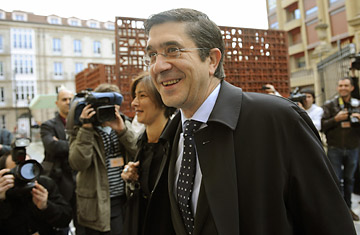
Leader of the Basque Socialist Party PSE-PSOE Patxi Lopez arrives at the Basque regional Parliament with his wife Begona Gil
When Patxi López began his investiture speech in the Basque regional parliament today, the first sentences out of his mouth were in euskera. Normally this wouldn't be a remarkable occurrence: the president of the Basque region routinely speaks the Basque language. But the swearing in of the Socialist López represents the first time in the three decades of Spain's democracy that the leader of the Basque region does not come from the pro-autonomy Basque Nationalist Party (PNV). As a result, every gesture — even the number of sentences he spoke in euskera — is being read for signs of how "Basque" the new Basque president will be.
"I ask for your trust, " López said once he had switched to Spanish, "to build a government that will overcome all the old, separating discourses of 'us,' vs. 'them' in order to construct a 'we' that includes everyone." By us vs. them, López means nationalists — those who support greater autonomy — and other parties including his own socialists, who support a closer relationship with the central government of Spain. (Read about Spain's Basque problems.)
For Gorka Landaburu, the mere fact that a non-nationalist might hold the region's highest office represents an unprecedented recognition of Basque political diversity. "It's an important day, you could even say an historic one," says the editor of the San Sebastian-based periodical Cambio 16. "Basque society is a plural society. This election reflects that."
But for the PNV, the new government doesn't so much reflect Basque society as represent an attempt to squash it's hard-won autonomy. The party won more votes than any single party in the March 1 regional election, but failed to achieve the necessary majority. Today, outgoing president Juan José Ibarretxe told the Basque parliament that the Socialist-led government does "not represent the majority of society," and cast the new government as "a serious attempt to annul Basque identity."
In his last term, Ibarretxe expended a good deal — some critics would say all — of his political capital in an ill-fated attempt to hold a referendum on independence for the Basque country. That effort was quashed by the Spanish parliament, which judged it unconstitutional. But the Socialist victory does not necessarily mean that Basque society as a whole is becoming less nationalist. According to polls conducted by Euskobarometro, the percentage of Basques who desire independence has hovered around 30% — sometimes rising a few points, sometimes falling — since 1980.
Some even argue that because the provincial governments and a majority of municipal ones remain in the hands of the PNV, the change in government will have little impact. "Look, it's important that the PNV has been substituted, it's a sign of the health of our democracy" says Carmen Gurruchaga, author of several books on Basque nationalism. "But it's window-dressing. All the real power — which is to say the economic power — is still with the PNV."
The biggest issue facing López, however, is the separatist group ETA, which relies on violence — the group has killed more than 800 people in its 40 year existence — to achieve its nationalist aims. The new lehendekari, or president, today promised to "erase ETA from the public space." Landaburu believes he has a better chance of doing so than his predecessors. "The PNV was always against ETA, but there was always ambiguity there too. When it served them, they would rely on the votes of ETA's supporters," he says in reference to nationalist parties like Batasuna and ANV, which refused to denounce ETA's violence.
But with those parties barred from running in the last election, this is the first time in modern history that there are no pro-ETA groups in parliament. That fact, coupled with the knowledge that ETA is at what is widely considered to be its weakest point in history, may enable López to capitalize on new talk of a negotiated peace. "Sooner or later, we're going to achieve what all of us — nationalist or non-nationalist — want, which is that things calm down in the Basque Country," says Landaburu, himself a victim of ETA's terrorism. "Maybe this is the new oxygen we need."
